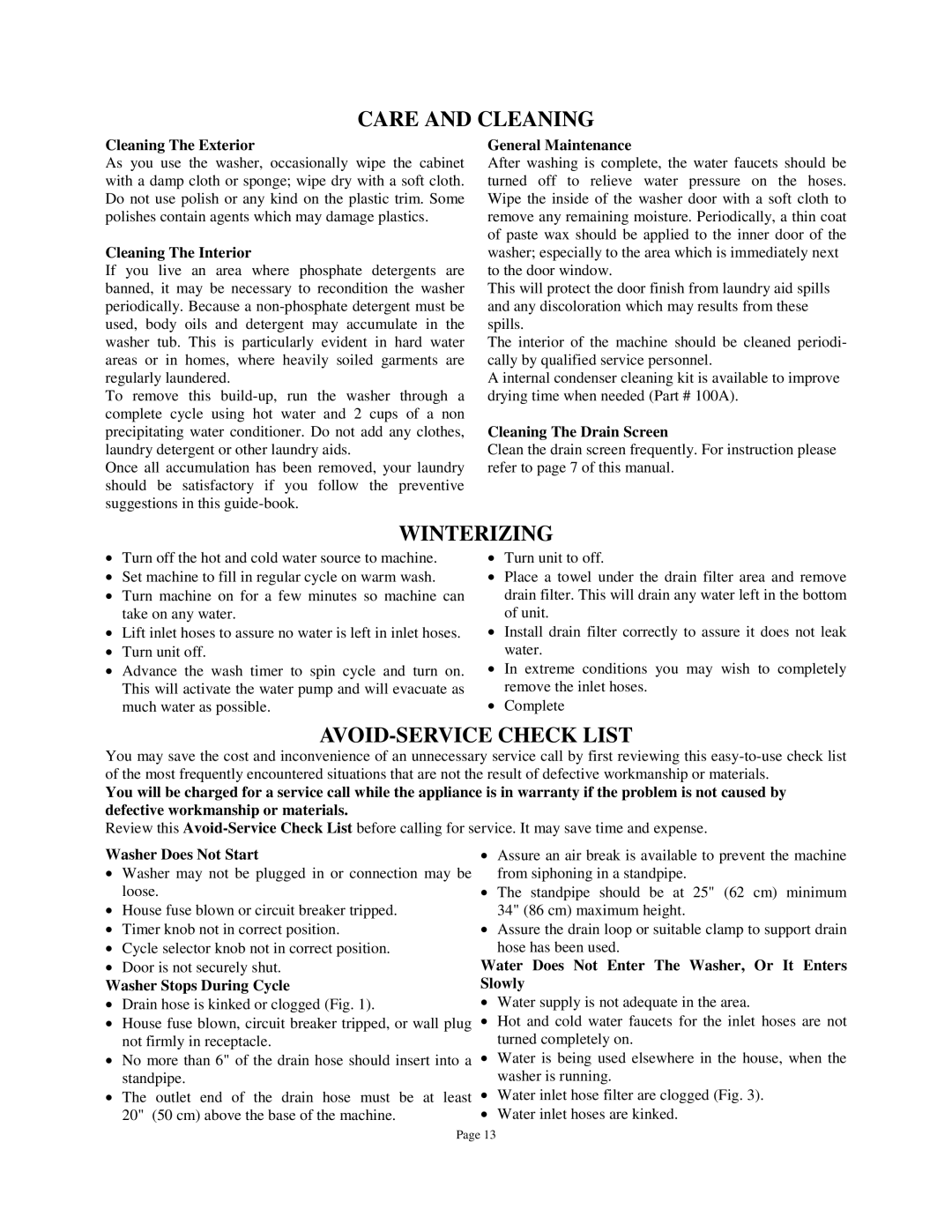CARE AND CLEANING
Cleaning The Exterior
As you use the washer, occasionally wipe the cabinet with a damp cloth or sponge; wipe dry with a soft cloth. Do not use polish or any kind on the plastic trim. Some polishes contain agents which may damage plastics.
Cleaning The Interior
If you live an area where phosphate detergents are banned, it may be necessary to recondition the washer periodically. Because a
To remove this
Once all accumulation has been removed, your laundry should be satisfactory if you follow the preventive suggestions in this
General Maintenance
After washing is complete, the water faucets should be turned off to relieve water pressure on the hoses. Wipe the inside of the washer door with a soft cloth to remove any remaining moisture. Periodically, a thin coat of paste wax should be applied to the inner door of the washer; especially to the area which is immediately next to the door window.
This will protect the door finish from laundry aid spills and any discoloration which may results from these spills.
The interior of the machine should be cleaned periodi- cally by qualified service personnel.
A internal condenser cleaning kit is available to improve drying time when needed (Part # 100A).
Cleaning The Drain Screen
Clean the drain screen frequently. For instruction please refer to page 7 of this manual.
WINTERIZING
•Turn off the hot and cold water source to machine.
•Set machine to fill in regular cycle on warm wash.
•Turn machine on for a few minutes so machine can take on any water.
•Lift inlet hoses to assure no water is left in inlet hoses.
•Turn unit off.
•Advance the wash timer to spin cycle and turn on. This will activate the water pump and will evacuate as much water as possible.
•Turn unit to off.
•Place a towel under the drain filter area and remove drain filter. This will drain any water left in the bottom of unit.
•Install drain filter correctly to assure it does not leak water.
•In extreme conditions you may wish to completely remove the inlet hoses.
•Complete
AVOID-SERVICE CHECK LIST
You may save the cost and inconvenience of an unnecessary service call by first reviewing this
You will be charged for a service call while the appliance is in warranty if the problem is not caused by defective workmanship or materials.
Review this
Washer Does Not Start | • Assure an air break is available to prevent the machine |
• Washer may not be plugged in or connection may be | from siphoning in a standpipe. |
loose. | • The standpipe should be at 25" (62 cm) minimum |
• House fuse blown or circuit breaker tripped. | 34" (86 cm) maximum height. |
• Timer knob not in correct position. | • Assure the drain loop or suitable clamp to support drain |
• Cycle selector knob not in correct position. | hose has been used. |
• Door is not securely shut. | Water Does Not Enter The Washer, Or It Enters |
Washer Stops During Cycle | Slowly |
• Drain hose is kinked or clogged (Fig. 1). | • Water supply is not adequate in the area. |
•House fuse blown, circuit breaker tripped, or wall plug • Hot and cold water faucets for the inlet hoses are not
not firmly in receptacle. | turned completely on. |
•No more than 6" of the drain hose should insert into a • Water is being used elsewhere in the house, when the
standpipe. | least • | washer is running. | |
• The | outlet end of the drain hose must be at | Water inlet hose filter are clogged (Fig. 3). | |
20" | (50 cm) above the base of the machine. | • | Water inlet hoses are kinked. |
Page 13
